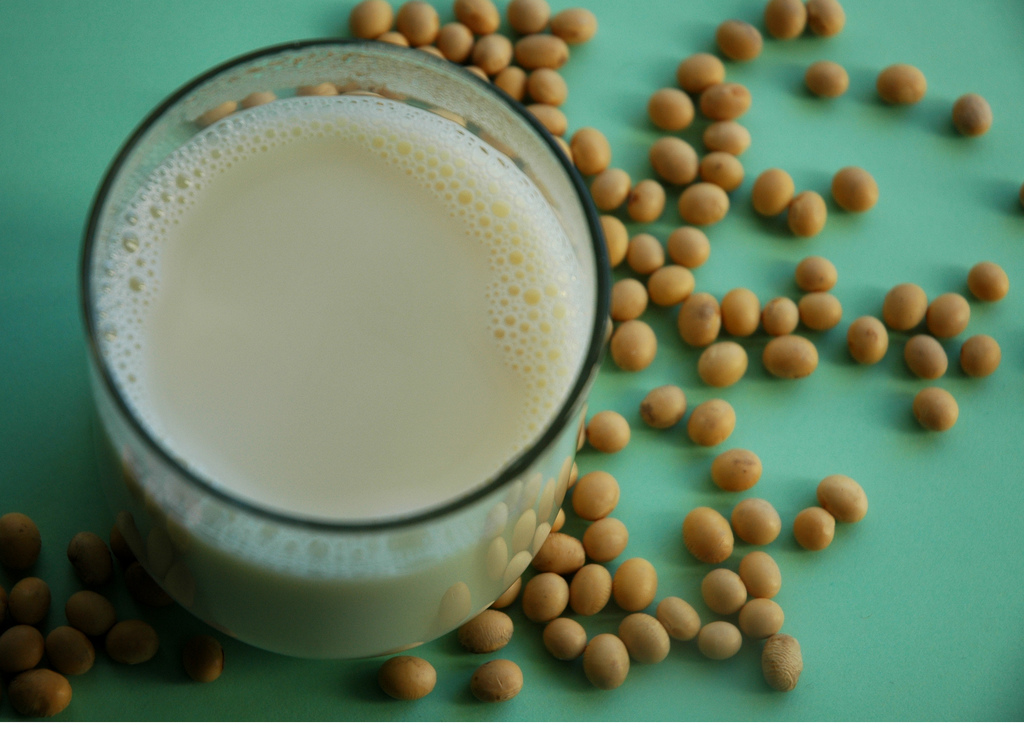
Need Milk? A Simple Guide to Plant-Based Milks
Photo Credit: mc559, via Flickr Creative Commons
Gone are the days when cow’s milk was the only choice at the grocery store. The shelves are now lined with an abundance of plant-based, non-dairy alternatives, including soy, almond, coconut, flax, hemp, oat and rice milk. The market for alternative milk is at an all-time high with retail sales expecting to top $1.7 billion annually.
Gone are the days when cow’s milk was the only choice at the grocery store.
Milk alternatives support a wide array of personal needs and preferences, everything from dairy allergies and intolerances to those people who are searching for alternatives to improve their general health. The Dr. Dean Ornish’s Program for Reversing Heart Disease suggests 0-2 servings of nonfat dairy a day. Lately, however, many questions have come up about the health benefits of dairy. The most simple answer that I have right now is that the jury is still out.
Some studies have shown negative health outcomes for people who drink cow’s milk. For example, a recent study done in Sweden found that cow milk drinkers had decreased bone density and higher mortality rates. On the other hand, a meta-analysis published in the journal Lipids concluded that cow’s milk reduced the risk of coronary heart disease, stroke, and hypertension, though the study concluded that more research needs to be done for a clearer understanding.
So depending on what you conclude for yourself, it’s still nice to have choices to support your needs and preferences. The new products available offer a spectrum of tastes, textures, nutrient profiles and health benefit claims. Most plant-based milks also come in a variety of flavors including vanilla, chocolate, carob, holiday nog, and unsweetened, which is recommended due to its limited sugar content. Because the choices can also feel overwhelming, especially when there is conflicting research touting the benefits of various milks, here are a few simple guidelines to follow.
Calcium, Vitamin D and A
Choose plant-based milks that are fortified with calcium, vitamin D and A. Most plant milks that are enriched with calcium surpass the content of dairy milk with up to 45 % of the daily recommended value, and also contain vitamin D to enhance absorption. Depending on the brand, plant milks can also be enriched with vitamin E, B12 and iron, making them a good source for these nutrients which are often lacking on a plant-based diet.
Non-GMO with Minimal Additives and Oils
As with all packaged foods, it is important to read labels and look for plant milks verified as non-GMO with minimal additives and added oils. Below is a list of plant-based milks that contain ≤ 3 grams of fat per 8 ounce serving, and are therefore approved as a low-fat option for the Dr. Dean Ornish Program for Reversing Heart Disease. They all fall within Group 1 of the Ornish Spectrum. The only exception is coconut milk due to its high concentration in saturated fat.
Soy Milk
Soaking, crushing and cooking soybeans to extract the liquid produces soy milk. It is a nutrient-dense option that trumps other plant-based milks with eight grams of protein per cup. Research shows that protein has been shown to provide cardiovascular benefits. The nutrition guidelines for Dr. Dean Ornish Program for Reversing Heart Disease recommends one serving of soy protein a day, including soy milk, because it provides a good replacement for animal protein in addition to its heart-health benefits. Soy milk is abundant in phytochemicals that have been associated with lowering cholesterol such as phytic acid, saponins, isoflavones, trypsin inhibitors, and fiber.
Rice Milk
An easily digestible milk and good choice for those with nut, soy, dairy and gluten allergies or sensitivities. However, there is only a trace of protein per cup of rice milk and it’s lower in antioxidant activity.
Oat Milk
This is an excellent choice for giving soups and sauces a rich, creamy texture as it doesn’t breakdown with heat. This milk has less protein and like other grain-based milks is higher in carbohydrates, but it is a good source of cholesterol-reducing fiber.
Almond Milk
This milk is a popular alternative to dairy with no cholesterol, no saturated fat, and less than three grams of fat in most brands. Almond milk is often a popular choice because it is lower in calories due to the primary ingredient being filtered water. At the same time, it lacks nutrient density and protein. A typical cup of almond milk only has one gram of protein, however, some almond milk brands have boosted the protein content up to five grams by adding other plant proteins such as rice and pea protein.
Flax Milk
An emerging plant milk that provides a source of omega-3 fatty acids with no saturated fat or cholesterol. Since the original milk is void of protein, some brands offer a flax plus protein milk that supplies up to five grams of protein per eight ounce serving.
Coconut Milk
This trendy option has exploded in the marketplace. Marketers tout its health benefits, but limited research has been done on it. Coconut milk has three times the saturated fat as cow’s milk and ranges between 90-500 calories per serving depending on whether or not it’s watered down. Coconut milk is not included in Ornish Spectrum Group 1 or on Dr. Dean Ornish’s Program for Reversing Heart Disease.
This is not an all-inclusive list; however, it is a glimpse into many of the choices available.
What is your milk of choice?







